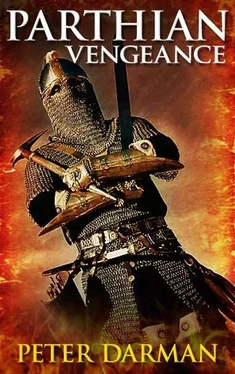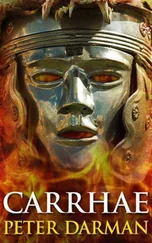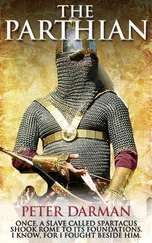Peter Darman - Parthian Vengeance
Здесь есть возможность читать онлайн «Peter Darman - Parthian Vengeance» весь текст электронной книги совершенно бесплатно (целиком полную версию без сокращений). В некоторых случаях можно слушать аудио, скачать через торрент в формате fb2 и присутствует краткое содержание. Год выпуска: 2012, Жанр: Исторические приключения, на английском языке. Описание произведения, (предисловие) а так же отзывы посетителей доступны на портале библиотеки ЛибКат.
- Название:Parthian Vengeance
- Автор:
- Жанр:
- Год:2012
- ISBN:нет данных
- Рейтинг книги:5 / 5. Голосов: 1
-
Избранное:Добавить в избранное
- Отзывы:
-
Ваша оценка:
- 100
- 1
- 2
- 3
- 4
- 5
Parthian Vengeance: краткое содержание, описание и аннотация
Предлагаем к чтению аннотацию, описание, краткое содержание или предисловие (зависит от того, что написал сам автор книги «Parthian Vengeance»). Если вы не нашли необходимую информацию о книге — напишите в комментариях, мы постараемся отыскать её.
Parthian Vengeance — читать онлайн бесплатно полную книгу (весь текст) целиком
Ниже представлен текст книги, разбитый по страницам. Система сохранения места последней прочитанной страницы, позволяет с удобством читать онлайн бесплатно книгу «Parthian Vengeance», без необходимости каждый раз заново искать на чём Вы остановились. Поставьте закладку, и сможете в любой момент перейти на страницу, на которой закончили чтение.
Интервал:
Закладка:
‘No,’ I said, ‘we will not launch an attack against Syria. I have no interest in conquering that province, which I would have to do if we invaded it.’
‘You don’t need to conquer it, just capture Antioch and kill Mithridates,’ argued Domitus.
‘And after we have done that,’ I replied, ‘what then?’
Domitus shrugged. ‘Then we withdraw to Dura.’
‘And when Crassus arrives with his army he will still march against us.’
‘But at least he won’t have the two Syrian legions if they have been destroyed,’ retorted Domitus.
I was unmoved. ‘No, we await developments. Having just finished fighting one war I have no desire to immediately embark upon another. The army needs time to rest and rebuild its strength.’
Rsan looked visibly relieved by my decision while Aaron looked disappointment. Alexander’s rebellion had always been a gamble. It was one thing supplying rebels with weapons, quite another for them to defeat the Roman occupiers. Well-armed bandits with excellent local knowledge would always be able to achieve success against isolated outposts and small garrisons, but Alexander aspired to be a general and to defeat the Romans on the battlefield, something that was very different and much harder to achieve.
That night I wrote to Orodes and Gafarn informing them of Byrd’s information and the whereabouts of Mithridates. Gallia had increased the number of guards on the city walls and in the Citadel, fearing that the former high king would again send assassins to kill me, and after the council meeting Dobbai had advised me to send my own assassins to Antioch to rid the world of Mithridates. I told her I would do no such thing. When I had finished writing it was late and the oil in my table lamp was burning low. The night was warm and there was no wind to stir the linen nets at the entrance from our bedroom to the balcony.
I looked at my sword in its scabbard propped up against the desk. It was eighteen years since Spartacus had given it to me when I had been a fresh-faced young man. Now I was forty years old and had known nothing but constant war during the intervening years. But I cheered myself with the thought that at least now the empire was united against its external enemies. If it came to war then I would not be fighting the Romans with one hand and Mithridates with the other.
I heard a rustle coming from the balcony. I drew my spatha from its scabbard and used it to ease aside one of the linen nets to see a huge black raven perched on the balustrade. He noticed the movement and turned his shaggy feathered neck to stare at me with his soulless eyes. I held his gaze and then he ducked his head forward and made a low, throaty rattling sound before spreading his wings and flying away.
The next day I sent the letters to Hatra and Ctesiphon and told Gallia about the visit of the raven while we sat on the palace terrace taking breakfast with our girls and Dobbai.
‘It is an omen foretelling the coming of war,’ remarked Dobbai.
I was unconcerned. ‘We know all about the Romans.’
‘The omen does not allude to the Romans,’ she said. ‘Another threat arises.’
‘You mean Mithridates?’ asked Gallia.
Dobbai shook her head. ‘No, child, something more dangerous.’
I dismissed her ramblings. There was no greater threat than the Romans and we would be fully prepared to meet them when they attacked. Dobbai saw omens everywhere.
After breakfast I went with Gallia to the stables to collect our horses prior to riding to the training fields to hone our archery skills. I was just about to hoist myself into the saddle when a rider trotted into the courtyard. A guard held his reins as he slid from the saddle and reached into his saddlebag. I watched as he said something to the guard who pointed at me, then strode across the flagstones before halting in front of me and bowing his head.
‘A letter from King Gafarn, majesty.’
He held out a rolled parchment with a seal bearing the horse head crest of Hatra. Gallia stared at it as I broke the seal and unrolled it. I read the words, sighed deeply and closed my eyes.
‘What is it?’ she asked.
I opened my eyes and handed her Gafarn’s letter. From the top of the palace steps I saw Dobbai looking at me and my blood ran cold. She had been right: the raven had been an omen.
‘The Armenians have declared war on Parthia.’
Epilogue
Aulus Gabinius was far from happy. Until fairly recently things had been going very well for him. Having helped to propel Pompey to power in Rome he had been made proconsul of Syria as a reward, a position from which he had profited enormously. In addition to destroying Pontus and reducing Armenia to a client kingdom of Rome, Pompey had crushed what was left of the Seleucid Empire to create the Roman province of Syria and as a bonus had also conquered Judea. When Gabinius had arrived in Syria to take up his new position he had been pleasantly surprised to discover that most of the towns and cities in his province had been accustomed to paying some sort of taxation for hundreds of years, and that in addition there was already in situ a network of local administrators to maintain the rule of law and collect said taxes. As a result money soon began to flow into the treasury at Antioch, the capital of Syria, from which Gabinius extracted a very large amount each month. It was a most satisfactory state of affairs.
Like most senior politicians and high-ranking soldiers of the Republic, Gabinius dressed and lived modestly, though they all endeavoured to accumulate large amounts of wealth to buy favours and influence in Rome. In this Gabinius was no different and had, since his arrival in Syria, amassed a fortune from the taxes levied on Syria and Judea. But now his extremely lucrative position was under threat.
First there had been a letter from his sponsor Pompey in Rome informing him that Marcus Licinius Crassus had been given the province of Syria for five years and an army of seven legions with which to fight a war against the Parthians. This meant that when Crassus arrived Gabinius would be replaced as governor of the province and recalled to Rome, which meant he had only a few months to profit from the province’s generous tax returns.
Then there had been the Jewish uprising in Judea, which had been totally unexpected and had at first threatened not only the entire Jewish kingdom but also the towns in southern Syria. Fortunately his very able cavalry commander had acted quickly to bring the rebels to battle and defeat them.
It was this young general who now awaited Gabinius in the atrium of his villa nestled in the hills at Daphne some five miles from Antioch, a delightful location that was home to the city’s wealthiest and most powerful citizens. It was also reputedly the spot where the god Apollo caught up with Daphne, a nymph he had fallen in love with, whereupon Daphne’s father, the river god Peneus, had turned his daughter into a laurel tree to prevent her losing her virginity. As a result of this myth there was an ancient law forbidding the cutting down or harming of any of the laurel trees that grew in the area.
Gabinius was sceptical about the place being the playground of gods but he had to admit that it seemed a most blessed place, filled with natural springs, waterfalls, citrus orchards, orchid gardens, laurel trees and myrtle. A man could be at peace with the world in such a paradise. But not today.
‘The Praefectus Alae Mark Antony awaits you, governor,’ the villa’s head steward announced as Gabinius strode into the dining room and reclined on one of the couches.
‘Show him in,’ he ordered, nodding to slaves who brought him dishes of fruits, meats and bread to eat, though he really had little appetite for food.
Читать дальшеИнтервал:
Закладка:
Похожие книги на «Parthian Vengeance»
Представляем Вашему вниманию похожие книги на «Parthian Vengeance» списком для выбора. Мы отобрали схожую по названию и смыслу литературу в надежде предоставить читателям больше вариантов отыскать новые, интересные, ещё непрочитанные произведения.
Обсуждение, отзывы о книге «Parthian Vengeance» и просто собственные мнения читателей. Оставьте ваши комментарии, напишите, что Вы думаете о произведении, его смысле или главных героях. Укажите что конкретно понравилось, а что нет, и почему Вы так считаете.












